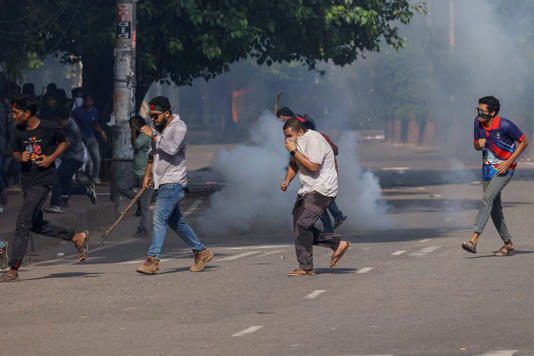DHAKA -The recent events in Bangladesh have brought to light the complexities and challenges of job quota systems in government employment. The protests by students against the job quota system, which reserves a significant percentage of government jobs for the descendants of veterans of the 1971 war of independence, have escalated into a national crisis. The use of tear gas and rubber bullets by police to disperse the protesters has raised serious concerns about the right to peaceful assembly and the state’s response to civil unrest.
The job quota system in Bangladesh was established with the intention of honoring the sacrifices made by the freedom fighters of the 1971 war. However, the current unrest suggests a growing sentiment among the youth that the system is outdated and needs reform. The students argue that the quota system is discriminatory and does not reflect the merit-based principles that should govern public employment. They demand a more equitable system that offers equal opportunities to all citizens, regardless of their familial ties to historical events.
The government’s job quota system has been a subject of debate for years, with proponents arguing that it is a necessary measure to ensure the welfare of the families of those who fought for the country’s independence. On the other hand, opponents of the system argue that it unfairly disadvantages qualified individuals who do not fall within the quota categories. The recent protests have intensified this debate, with tragic outcomes, including the loss of lives and injuries to many.
The situation in Bangladesh serves as a reminder of the delicate balance that must be maintained between honoring historical contributions and ensuring a fair and just system for the current generation. It also highlights the need for dialogue and peaceful resolution of conflicts. The government’s response to the protests will be a critical test of its commitment to democratic principles and human rights.
As the world watches, it is hoped that a peaceful and constructive solution can be found that addresses the concerns of the students while respecting the legacy of the nation’s history. The path forward will require empathy, understanding, and a willingness to adapt to the evolving needs of society. The resolution of this conflict could set a precedent for how similar issues are handled in the future, not only in Bangladesh but in other nations facing similar challenges.
For more detailed information on the unfolding events and the background of the job quota system in Bangladesh, readers can refer to the comprehensive reports provided by various news outlets.
– Recent protests in Bangladesh have escalated, resulting in the use of tear gas and rubber bullets by police to disperse demonstrators.
– The protests are centered around opposition to the government’s job quota system, which reserves a significant percentage of government jobs for certain groups.
– There have been reports of casualties and injuries due to the clashes between students and law enforcement.
– Educational institutions have been shut down temporarily due to the unrest.
– The job quota system in question is linked to the 1971 war of independence, allocating positions to descendants of veterans.
– The situation has garnered attention from international media, highlighting the tension and violence associated with the protests.

